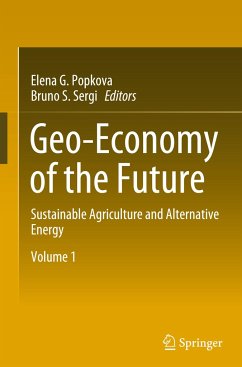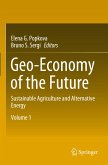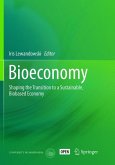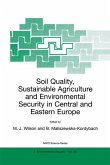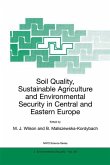Geo-Economy of the Future
Sustainable Agriculture and Alternative Energy
Herausgegeben:Popkova, Elena G.; Sergi, Bruno S.
Geo-Economy of the Future
Sustainable Agriculture and Alternative Energy
Herausgegeben:Popkova, Elena G.; Sergi, Bruno S.
- Gebundenes Buch
- Merkliste
- Auf die Merkliste
- Bewerten Bewerten
- Teilen
- Produkt teilen
- Produkterinnerung
- Produkterinnerung
This book presents an international review of the modern geo-economy and a scientific take on the geo-economy of the future. It identifies the challenges of climate change and their impact on the modern geo-economy. Prospects for the geo-economy of the future are outlined based on sustainable agriculture and alternative energy. Policy implications are put forward to develop a geo-economy of the future in response to the challenges of climate change. The book presents management implications for the development of the geo-economy of the future in response to the challenges of climate change at…mehr
Andere Kunden interessierten sich auch für
![Geo-Economy of the Future Geo-Economy of the Future]() Geo-Economy of the Future115,99 €
Geo-Economy of the Future115,99 €![Bioeconomy Bioeconomy]() Bioeconomy38,99 €
Bioeconomy38,99 €![The Economics of Forest Disturbances The Economics of Forest Disturbances]() Thomas P. Holmes / Jeffrey P. Prestemon / Karen L. Abt (eds.)The Economics of Forest Disturbances149,99 €
Thomas P. Holmes / Jeffrey P. Prestemon / Karen L. Abt (eds.)The Economics of Forest Disturbances149,99 €![Soil Quality, Sustainable Agriculture and Environmental Security in Central and Eastern Europe Soil Quality, Sustainable Agriculture and Environmental Security in Central and Eastern Europe]() WilsonSoil Quality, Sustainable Agriculture and Environmental Security in Central and Eastern Europe77,99 €
WilsonSoil Quality, Sustainable Agriculture and Environmental Security in Central and Eastern Europe77,99 €![Soil Quality, Sustainable Agriculture and Environmental Security in Central and Eastern Europe Soil Quality, Sustainable Agriculture and Environmental Security in Central and Eastern Europe]() WilsonSoil Quality, Sustainable Agriculture and Environmental Security in Central and Eastern Europe77,99 €
WilsonSoil Quality, Sustainable Agriculture and Environmental Security in Central and Eastern Europe77,99 €![Re-Imagining Resilient Productive Landscapes Re-Imagining Resilient Productive Landscapes]() Re-Imagining Resilient Productive Landscapes100,99 €
Re-Imagining Resilient Productive Landscapes100,99 €![Agriculture, Livestock Production and Aquaculture Agriculture, Livestock Production and Aquaculture]() Agriculture, Livestock Production and Aquaculture119,99 €
Agriculture, Livestock Production and Aquaculture119,99 €-
-
-
This book presents an international review of the modern geo-economy and a scientific take on the geo-economy of the future. It identifies the challenges of climate change and their impact on the modern geo-economy. Prospects for the geo-economy of the future are outlined based on sustainable agriculture and alternative energy. Policy implications are put forward to develop a geo-economy of the future in response to the challenges of climate change. The book presents management implications for the development of the geo-economy of the future in response to the challenges of climate change at the regional and global scale.
It presents the lessons-learned through the COVID-19 pandemic, and applies experiences of countries with different environmental conditions for agriculture and the development of the energy sector. Based on these results, advanced practical recommendations and ready-made frameworks at the national, regional, and enterprise level are provided.
Hinweis: Dieser Artikel kann nur an eine deutsche Lieferadresse ausgeliefert werden.
It presents the lessons-learned through the COVID-19 pandemic, and applies experiences of countries with different environmental conditions for agriculture and the development of the energy sector. Based on these results, advanced practical recommendations and ready-made frameworks at the national, regional, and enterprise level are provided.
Hinweis: Dieser Artikel kann nur an eine deutsche Lieferadresse ausgeliefert werden.
Produktdetails
- Produktdetails
- Geoplanet: Earth and Planetary Sciences
- Verlag: Springer / Springer International Publishing / Springer, Berlin
- Artikelnr. des Verlages: 978-3-030-92302-0
- 1st edition 2022
- Seitenzahl: 948
- Erscheinungstermin: 8. Juni 2022
- Englisch
- Abmessung: 241mm x 160mm x 62mm
- Gewicht: 1744g
- ISBN-13: 9783030923020
- ISBN-10: 3030923029
- Artikelnr.: 62839789
- Herstellerkennzeichnung Die Herstellerinformationen sind derzeit nicht verfügbar.
- Geoplanet: Earth and Planetary Sciences
- Verlag: Springer / Springer International Publishing / Springer, Berlin
- Artikelnr. des Verlages: 978-3-030-92302-0
- 1st edition 2022
- Seitenzahl: 948
- Erscheinungstermin: 8. Juni 2022
- Englisch
- Abmessung: 241mm x 160mm x 62mm
- Gewicht: 1744g
- ISBN-13: 9783030923020
- ISBN-10: 3030923029
- Artikelnr.: 62839789
- Herstellerkennzeichnung Die Herstellerinformationen sind derzeit nicht verfügbar.
Elena G. Popkova - Doctor of Science (Economics), is Founder and President of the Institute of Scientific Communications (Russia) and Leading Researcher of the Center for Applied Research of the chair "Economic policy and public-private partnership" of Moscow State Institute of International Relations (MGIMO) (Moscow, Russia). Her scientific interests include the theory of economic growth, sustainable development, globalization, humanization of economic growth, emerging markets, social entrepreneurship, and the digital economy and Industry 4.0. Elena G. Popkova organizes all-Russian and international scientific and practical conferences and is Editor and Author of collective monographs, and she serves as Guest Editor of international scientific journals. She has published more than 300 works in Russian and foreign peer-reviewed scientific journals and books. Bruno S. Sergi, Ph.D., is Professor of International Economics, University of Messina, and Associate, Davis Center for Russian and Eurasian Studies, Harvard University. Bruno S. Sergi teaches at the Harvard Extension School on the economics of emerging markets and the political economy of Russia and China. Sergi is Associate of Harvard University's Davis Center for Russian and Eurasian Studies and the Harvard Ukrainian Research Institute. He also teaches political economy and international finance at the University of Messina, Italy. He is Series Editor of Cambridge's Elements in the Economics of Emerging Markets (Cambridge University Press), as well as Editor for Entrepreneurship and Global Economic Growth and Co-Series Editor of Lab for Entrepreneurship and Development (Emerald Publishing). He is Founder and Editor-in-Chief of the International Journal of Trade and Global Markets, the International Journal of Economic Policy in Emerging Economies, and the International Journal of Monetary Economics and Finance. He is Associate Editor of The American Economist. He has published several articles in scholarly journals and many books as Author, Co-Author, Editor, or Co-Editor. Sergi's academic career and advisory roles have established him as a frequent guest and a commentator on matters of contemporary developments in political economies and emerging markets in a wide range of media. Sergi holds a Ph.D. in Economics from the University of Greenwich Business School, London.
Part I. State legal regulation and technologies of responsible nature use.- Chapter 1. Role of Government Policies in Improving Ecological Management of Industrial Economy (Gulzat K. Kantoroeva).- Chapter 2. Environmental Investments as a Form of Social Responsibility of Business in a Mining Region (Evgeny E. Shvakov).- Chapter 3. Improving Customs Services in the Context of Developing the Goods Traceability System (Petr N. Afonin).- Chapter 4. COVID-19's impulse to intensify neo-industrial digital technologies 4.0 in the legal regulation of foreign economic activity of economic entities of the EAEU and the BRICS Member States (Agnessa O. Inshakova).- Chapter 5. Concepts and Categories of Interstate Regulation in the Implementation and Legal Risks in the Application of Digital Technologies of Industry 4.0 at the Level of the EAEU and BRICS (Alexander I. Goncharov).- Chapter 6. The concept of neo-industrial modernization of legal regulation strategy for the intensification of digital technologies in the EAEU and the BRICS (Agnessa O. Inshakova).- Chapter 7. Features of Corporate Social Responsibility in Russia within the Framework of Sustainable Development (Irina V. Degtyareva).- Chapter 8. The Economic Security Threats of the Region in Terms of Digitalization: Assessment and Development of Leveling Tools (Evgeniya K. Karpunina).- Chapter 9. The Modern Social Contract: Prerequisites for Renewal (Ekaterina I. Shumskaia).- Chapter 10. Impact of Globalization on Internal Migration of Population (Natalya V. Vorontsova).- Chapter 11. ESG Banking: a Fundamental Component of Sustainable Development, or Development without Prejudice to the Future of Russia (Elena P. Ermakova).- Chapter 12. Socio-Political and International Legal Basis for a Paradigm Shift in Russian Criminal Law (Elena N. Senina).- Chapter 13. Book Review Inshakova, A.O., Bogoviz, A.V. (Eds.) "Alternative Methods of Judging the Economic Conflicts in the National Positive and Soft Law" (Agnessa O. Inshakova).- Chapter 14. Book Review Inshakova A. O., Frolova E. E. (Eds.) "The Transformation of Social Relationships in Industry 4.0: Economic Security and Legal Prevention" (Agnessa O. Inshakova).- Chapter 15. Mediation as an Alternative Dispute Resolution in Intellectual Property Disputes in Turkey and Russian Federation (Canan Kucukali).- Chapter 16. Interregional Differentiation of Income and Expenditure of the Russian Population: Assessment in the Long-Term Dynamics (Evgeniya K. Karpunina).- Chapter 17. Monopolization of the Global Economy: on the Example of the American Multinational Enterprises (Yulia A. Konovalova).- Chapter 18. The Role of Migration in the Contemporary Demographic Development of Russia (Roman V. Manshin).- Chapter 19. Russian Regions: Assessment of Factors of Growth in the Living Standard and Well-Being of the Population (Natalia I. Kuzmenko).- Part II. Responsible production and sustainable regions, cities and communities.- Chapter 20. Eco-industrial Parks (EIP) as a Tool for Modern Innovative Industry (Marina N. Levkina).- Chapter 21. Economic Assessment of Complex Damage from Extractive Industries, Considering the Environmental Factor (Takhir K. Toguzaev).- Chapter 22. Effects of Education Transformation in Pandemic: A Regional Perspective (Yuliya R. Rudneva).
Part I. State legal regulation and technologies of responsible nature use.- Chapter 1. Role of Government Policies in Improving Ecological Management of Industrial Economy (Gulzat K. Kantoroeva).- Chapter 2. Environmental Investments as a Form of Social Responsibility of Business in a Mining Region (Evgeny E. Shvakov).- Chapter 3. Improving Customs Services in the Context of Developing the Goods Traceability System (Petr N. Afonin).- Chapter 4. COVID-19's impulse to intensify neo-industrial digital technologies 4.0 in the legal regulation of foreign economic activity of economic entities of the EAEU and the BRICS Member States (Agnessa O. Inshakova).- Chapter 5. Concepts and Categories of Interstate Regulation in the Implementation and Legal Risks in the Application of Digital Technologies of Industry 4.0 at the Level of the EAEU and BRICS (Alexander I. Goncharov).- Chapter 6. The concept of neo-industrial modernization of legal regulation strategy for the intensification of digital technologies in the EAEU and the BRICS (Agnessa O. Inshakova).- Chapter 7. Features of Corporate Social Responsibility in Russia within the Framework of Sustainable Development (Irina V. Degtyareva).- Chapter 8. The Economic Security Threats of the Region in Terms of Digitalization: Assessment and Development of Leveling Tools (Evgeniya K. Karpunina).- Chapter 9. The Modern Social Contract: Prerequisites for Renewal (Ekaterina I. Shumskaia).- Chapter 10. Impact of Globalization on Internal Migration of Population (Natalya V. Vorontsova).- Chapter 11. ESG Banking: a Fundamental Component of Sustainable Development, or Development without Prejudice to the Future of Russia (Elena P. Ermakova).- Chapter 12. Socio-Political and International Legal Basis for a Paradigm Shift in Russian Criminal Law (Elena N. Senina).- Chapter 13. Book Review Inshakova, A.O., Bogoviz, A.V. (Eds.) "Alternative Methods of Judging the Economic Conflicts in the National Positive and Soft Law" (Agnessa O. Inshakova).- Chapter 14. Book Review Inshakova A. O., Frolova E. E. (Eds.) "The Transformation of Social Relationships in Industry 4.0: Economic Security and Legal Prevention" (Agnessa O. Inshakova).- Chapter 15. Mediation as an Alternative Dispute Resolution in Intellectual Property Disputes in Turkey and Russian Federation (Canan Kucukali).- Chapter 16. Interregional Differentiation of Income and Expenditure of the Russian Population: Assessment in the Long-Term Dynamics (Evgeniya K. Karpunina).- Chapter 17. Monopolization of the Global Economy: on the Example of the American Multinational Enterprises (Yulia A. Konovalova).- Chapter 18. The Role of Migration in the Contemporary Demographic Development of Russia (Roman V. Manshin).- Chapter 19. Russian Regions: Assessment of Factors of Growth in the Living Standard and Well-Being of the Population (Natalia I. Kuzmenko).- Part II. Responsible production and sustainable regions, cities and communities.- Chapter 20. Eco-industrial Parks (EIP) as a Tool for Modern Innovative Industry (Marina N. Levkina).- Chapter 21. Economic Assessment of Complex Damage from Extractive Industries, Considering the Environmental Factor (Takhir K. Toguzaev).- Chapter 22. Effects of Education Transformation in Pandemic: A Regional Perspective (Yuliya R. Rudneva).

